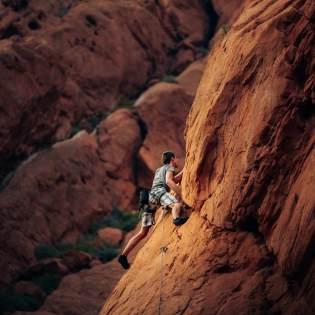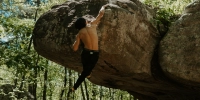Conquering The Mind: Overcoming Mental Blocks And Fear In Climbing

Climbing is as much a mental game as it is a physical one. As you push your limits on the rock or in the gym, you'll inevitably encounter invisible barriers – mental blocks and fears that can hinder your progress, erode your confidence, and prevent you from realizing your full potential. From the gnawing fear of falling to debilitating self-doubt, these psychological challenges are a universal part of the climber's journey. This comprehensive guide will illuminate common mental blocks, delve into actionable strategies for managing and overcoming the fear of heights and falling, and equip you with the mental tools needed to unlock a stronger, more confident climbing experience.
- Common Mental Blocks That Climbers Experience
- 1. Fear Of Falling
- 2. Route Anxiety (Performance Anxiety)
- 3. Self-Doubt And Negative Self-Talk
- 4. Fear Of Failure/Success
- 5. Perfectionism
- Overcoming Fear While Climbing Heights: Practical Strategies For The Fear Of Falling
- 1. Practice Deep, Controlled Breathing
- 2. Visualize Successful Climbs
- 3. Stay Present And Focused
- 4. Gradual Exposure (Exposure Therapy)
- 5. Use Positive Self-Talk
- 6. Training And Preparation
- 7. Set Achievable Goals
- 8. Surround Yourself With Supportive Climbing Partners
- 9. Mindfulness And Body Awareness
- Conclusion
- FAQ: Conquering Mental Blocks And Fear In Climbing
- What Are Common Mental Blocks Climbers Face?
- How Can I Manage The Fear Of Falling While Climbing?
- Is The Fear Of Falling Normal For Climbers?
- How Does Gradual Exposure Help Overcome Fear Of Heights/falling?
- What Is "route Anxiety" And How Can I Deal With It?
- How Important Is A Supportive Climbing Partner For Overcoming Fear?
- Can Mental Blocks Really Prevent Me From Improving In Climbing?
- What's The Role Of Training And Preparation In Overcoming Mental Fears?
Common Mental Blocks That Climbers Experience
Mental blocks are psychological barriers that can manifest in various ways, impacting a climber's performance, decision-making, and overall enjoyment. Recognizing these common challenges is the first step toward addressing them.
1. Fear of Falling
This is perhaps the most universal and impactful mental block in climbing. It can range from a mild apprehension to a paralyzing phobia.
-
How it manifests: Leads to hesitation, over-gripping (using excessive force on holds), taking fewer risks, and sometimes even causes the very falls it's meant to prevent due to fatigue or rigid movement. Climbers might "stick" to the wall, unable to make the next move, or refuse to lead above protection.
-
Impact: Significantly limits progress, particularly in lead climbing and bouldering where falls are an inherent part of the learning process.
2. Route Anxiety (Performance Anxiety)
Stress and apprehension when attempting challenging routes or problems.
-
How it manifests: Impaired focus, increased heart rate, shallow breathing, muscle tension, and a general feeling of unease before or during a climb. Climbers might "choke" on routes they've practiced many times or feel overwhelmed by the perceived difficulty.
-
Impact: Hinders concentration, reduces confidence, and makes it difficult to perform at one's best, even on climbs well within one's physical capabilities.
3. Self-Doubt and Negative Self-Talk
An internal critic that undermines confidence.
-
How it manifests: "I'm not strong enough," "I'll never get this," "I'm going to fall." These thoughts can become a self-fulfilling prophecy, eroding self-belief and leading to giving up prematurely.
-
Impact: Prevents climbers from attempting harder grades, pushing their limits, or even enjoying the process due to a constant stream of discouraging internal commentary.
4. Fear of Failure/Success
-
Fear of Failure: The reluctance to attempt a hard route because of the possibility of not completing it, leading to avoiding challenges.
-
Fear of Success: A less common but subtle block where a climber might subconsciously hold back from reaching their full potential, perhaps due to fear of the increased pressure or expectations that come with higher grades.
5. Perfectionism
The desire to climb flawlessly, leading to frustration and anxiety when mistakes are made.
-
How it manifests: Over-analyzing every move, getting overly frustrated by minor slips, or refusing to try dynamic moves for fear of looking ungraceful.
-
Impact: Can stifle creativity, lead to over-gripping, and make climbing less enjoyable by focusing on an unattainable ideal.
Overcoming Fear While Climbing Heights: Practical Strategies for the Fear of Falling
The fear of falling, especially from significant heights, is an innate human response. However, for climbers, managing and overcoming this fear is essential for progression and enjoyment. This isn't about eliminating fear entirely, but about developing strategies to manage it and reduce its paralyzing effects.
1. Practice Deep, Controlled Breathing
Your breath is a powerful tool for regulating your nervous system.
-
How to do it: When fear or anxiety arises, pause (if safe to do so) and take several slow, deep breaths. Inhale deeply through your nose, filling your belly, hold for a few seconds, and then exhale slowly and completely through your mouth. Focus on the sensation of your breath.
-
Benefits: Deep breathing activates your parasympathetic nervous system, helping to lower heart rate, reduce muscle tension, and promote a sense of calm, allowing for clearer thinking.
2. Visualize Successful Climbs
Mental rehearsal can program your mind for success.
-
How to do it: Before attempting a challenging route or even on rest days, close your eyes and vividly imagine yourself successfully executing every move. See yourself moving smoothly, gripping holds confidently, and reaching the top. Visualize yourself managing any moments of fear with controlled breathing.
-
Benefits: Builds mental pathways for success, increases confidence, and reduces anxiety by familiarizing your mind with positive outcomes.
3. Stay Present and Focused
Fear often stems from worrying about future outcomes (e.g., "What if I fall?").
-
How to do it: Bring your attention back to the current moment. Focus on the texture of the hold you're on, the feel of your shoe on the foothold, your breath, or the next single move. Use sensory details to anchor yourself in the present. Avoid letting your mind wander to the top of the climb or potential falls.
-
Benefits: Reduces overthinking, conserves mental energy, and allows you to concentrate on the immediate task, improving execution.
4. Gradual Exposure (Exposure Therapy)
Confronting fear in small, manageable steps. This is particularly effective for fear of falling.
-
How to do it:
-
Start Low: Begin by taking intentional falls on easy, safe routes in the gym, just a few feet off the ground, with a trusted belayer.
-
Practice "Whips": Gradually increase the height of your falls, taking controlled "whips" (lead falls) onto good protection, ensuring your belayer knows you're practicing. Start with falls just above the quickdraw, then slightly higher.
-
Trust the Rope and Belayer: Focus on the sensation of the rope catching you and the belayer's reliability. The goal is to re-educate your nervous system that falling is generally safe.
-
Progress Slowly: Do not rush this process. Only increase height or exposure when you feel comfortable at the current level.
-
-
Benefits: Desensitizes you to the sensation of falling, builds trust in your gear and partner, and re-wires your brain to understand that falling is a normal and safe part of climbing.
5. Use Positive Self-Talk
Counteract negative thoughts with empowering affirmations.
-
How to do it: Actively challenge self-doubt. Replace "I can't do this" with "I am capable," "I've trained for this," or "One move at a time." Use a strong, confident inner voice.
-
Benefits: Boosts self-confidence, improves focus, and creates a more positive mindset, making you more resilient to challenges.
6. Training and Preparation
Physical readiness boosts mental confidence.
-
How to do it: Consistently train your climbing-specific strength, endurance, and technique. The more physically prepared you are, the more confident you'll feel in your ability to execute moves. Practice falling in a controlled environment as described above.
-
Benefits: Reduces the mental burden of worrying about physical failure, allowing you to focus on the climb itself.
7. Set Achievable Goals
Break down big challenges into smaller, manageable steps.
-
How to do it: Instead of "I must send this V8," set goals like "I will try this move 5 times," or "I will commit to falling cleanly from this point." For heights, set a goal like "I will climb one meter higher than last time before taking a fall."
-
Benefits: Reduces overwhelm, builds momentum through small successes, and makes progression feel less daunting.
8. Surround Yourself with Supportive Climbing Partners
Your climbing partners can significantly influence your mental state.
-
How to do it: Seek out partners who are encouraging, patient, and understanding of your fears. A good partner will offer constructive feedback, be a reliable belayer/spotter, and create a safe and positive environment. Avoid partners who are overly critical or push you beyond your comfort zone unsafely.
-
Benefits: Provides external reassurance, fosters a sense of security, and creates a positive feedback loop that helps build confidence.
9. Mindfulness and Body Awareness
Being attuned to your physical sensations can help manage anxiety.
-
How to do it: Pay attention to where you feel tension in your body when you're scared. Consciously try to relax those muscles. Practice body scans during rest periods to identify and release unnecessary tension.
-
Benefits: Allows you to address physical manifestations of fear (like over-gripping) directly, leading to more efficient movement and reduced fatigue.
Conclusion
Conquering mental blocks and fear is an ongoing, integral part of the climbing journey. By understanding the common psychological barriers and systematically applying strategies for breath control, visualization, gradual exposure, and positive self-talk, climbers can transform limiting fears into opportunities for growth. Remember that mental strength is developed just like physical strength – through consistent practice, patience, and a willingness to step outside your comfort zone in a controlled manner. Embrace these tools, trust your preparation, and unlock a more confident, focused, and ultimately more fulfilling climbing experience, allowing you to reach new heights both on and off the wall.
FAQ: Conquering Mental Blocks and Fear in Climbing
What are common mental blocks climbers face?
Common mental blocks include fear of falling, route anxiety (performance anxiety), self-doubt, negative self-talk, fear of failure (or success), and perfectionism.
How can I manage the fear of falling while climbing?
Manage the fear of falling by practicing deep, controlled breathing, visualizing successful climbs, staying present and focused on the current move, gradually exposing yourself to falls in safe environments, and using positive self-talk.
Is the fear of falling normal for climbers?
Yes, the fear of falling is a very normal and natural human response. Nearly all climbers experience it to some degree. The goal is not to eliminate it, but to learn how to manage and overcome its paralyzing effects.
How does gradual exposure help overcome fear of heights/falling?
Gradual exposure involves repeatedly and intentionally exposing yourself to the feared situation (e.g., falling) in small, controlled increments. This helps to desensitize your nervous system, build trust in your gear and belayer, and re-educate your brain that falling is generally safe.
What is "route anxiety" and how can I deal with it?
Route anxiety is stress or apprehension when attempting challenging routes. You can deal with it by practicing visualization, focusing on one move at a time, using positive self-talk, and ensuring you have sufficient training and preparation for the route's demands.
How important is a supportive climbing partner for overcoming fear?
A supportive climbing partner is crucial. They provide a safe and encouraging environment, offer reliable belaying/spotting, give constructive feedback, and can help you feel more secure and confident when pushing your limits.
Can mental blocks really prevent me from improving in climbing?
Absolutely. Mental blocks can be as restrictive as physical limitations. They can lead to hesitation, inefficient movement, over-gripping, and self-sabotage, directly hindering your ability to progress to harder grades or enjoy the sport fully.
What's the role of training and preparation in overcoming mental fears?
Being well-trained and prepared physically boosts your mental confidence. When you know you have the strength and technique for a climb, it reduces the mental burden of physical inadequacy, allowing you to focus more on the psychological aspects of the ascent.













